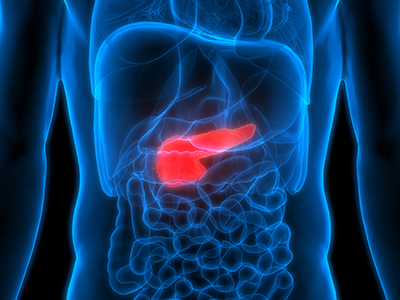 In 2021 an estimated 60,430 Americans will be diagnosed with pancreatic cancer in the U.S., and more than 48,220 will die from the disease.
In 2021 an estimated 60,430 Americans will be diagnosed with pancreatic cancer in the U.S., and more than 48,220 will die from the disease.
One of the deadliest characteristics of pancreatic cancer is its ability to grow and spread to other parts of the body, known as metastasis. If isolated, cancer is generally easier to target and treat. Otherwise, as it spreads, it creates a moving target for physicians.
A team of researchers at UAB seeks to change that. Led by Director of the Division of Surgical Oncology Vikas Dudeja, MBBS, the team discovered a potential treatment for pancreatic cancer: the inhibition of a tumor-growing agent known as Hsp70.
According to researchers, heat shock protein 70 (Hsp70), a protein chaperone, is known to promote cell survival and tumor progression. However, it has not been closely studied in what is known as the tumor microenvironment (TME), which is the normal cells, molecules, and blood vessels that surround and feed a tumor cell.
To figure out of Hsp70 contributed to tumor growth in the TME, researchers created one TME with Hsp70 and one TME without Hsp70. Their results do suggest that the absence of Hsp70 in the TME inhibits tumors.
How does it do so? Through the help of the immune system. It turns out that without Hsp70 in the TME, dendritic cells are activated. Dendritic cells are key players in your immune system with the ability to fight against the growth of the tumor.
In the past, pancreatic cancer has not shown much response when treated with immunotherapy, a type of cancer treatment that helps your immune system fight cancer. This is likely because in pancreatic cancer, there is a low number of dendritic cells, immune helpers, in tumors.
Absence of Hsp70 in the TME is to dendritic cells as coffee is to us humans. Without Hsp70 in the TME, although the number of dendritic cells does not increase, the existing dendritic cells in the TME become activated, or energized. This then opens the door again for physicians to look at using immunotherapy as a potential treatment for pancreatic cancer.
“We are thrilled that our findings suggest a novel way to treat pancreatic cancer, through the inhibition of Hsp70 in dendritic cells,” said Dudeja. “Our hope is that we can curb this incredibly devastating disease and offer more effective methods of treatment for our patients.”
The timely research brings hope just a few weeks before Pancreatic Cancer Awareness Month in November, a time to remember those affected by pancreatic cancer and learn more about the signs, symptoms, and early detection of the disease.